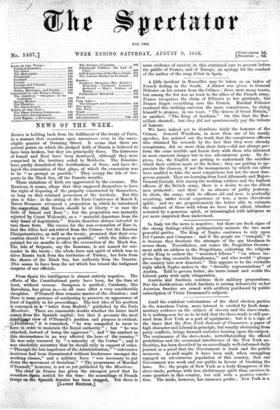A little incident in Marseilles may be taken as an
index of French feeling in the South. A dinner was given to General Pelissier on his return from the Crimea; there were many toasts, but among the list was no toast to the allies of the French army. France recognizes the claim of Pelissier to her gratitude, but France forgot everything save the French. Marshal Pelissier rendered this striking omission the more conspicuous, by rising himself to propose, in one toast, "The Queen of Great Britain," in another, "The King of Sardinia." On this hint the Marseillais shouted ; but they Aid not spontaneously pay the tribute of honour. We have indeed yet to distribute fairly the honours of the Crimea. General Windham, in more than one of his manly speeches, has pointed out the truth that the conspicuous officers who obtained the rewards by the fact that they were already conspicuous, did no more than their duty—did not always perform the same terrible and heroic duty with those who laboured in more constant danger but in less adventurous posts. By degrees, too, the English are getting to understand the sacrifice which their soldiers made at the Redan ; they are getting to appreciate the chances, if not the management, by which our allies were enabled to take the most conspicuous but not the most dangerous assault. They are learning from Lord Albemarle and MajorGeneral 94=04, that among the working soldiers and. the highest officers of the British army, there is a desire to see the ablest men prOinoted ; and there is an absence of paltry jealousy. In short, the army, with its officers old and new, is gradually acquiring, under recent experience of war, a more chivalrous spirit ; and we are proportionately the better able to estimate the conduct of those with whom we have been allied, whether actuated by a generous spirit, or intermingled with intrigues as yet more suspected than understood.
























